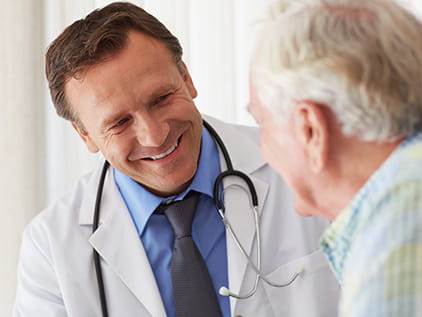- Home
- Conditions and Care
- Specialties
- Heart Care
- Heart Care Services
- Diagnostics and Imaging
Heart Care
Heart Diagnostics and Imaging
To diagnose and treat heart disease, doctors use many tools. The University of Kansas Health System offers today's leading, advanced cardiac diagnostic tests and imaging equipment in Kansas City. Our certified sonographers are able to capture detailed pictures of your heart, arteries and veins, as well as their activities. This helps ensure you receive an accurate diagnosis and minimizes the need for additional testing.
Our physicians stay up to date on the most current trends in cardiology to provide you the best care.
Innovation in diagnostics and imaging
Technology is constantly changing, and The University of Kansas Health System in Kansas City is keeping up. That's why we are always adding new equipment for cardiac diagnostic testing and imaging.
Because there are so many different types of heart disease, and numerous treatment options depending on the condition, accurate diagnosis is critical. Using the most advanced screening techniques available, we can better determine the underlying cause of your heart problem and reduce the amount of testing needed.
We offer a variety of appointment types. Learn more or call 913-588-1227 to schedule now.
Why choose us
- We offer the most current imaging tests to meet your needs. Our imaging specialists are among the most highly trained and experienced in the nation.
- Our high volume of echocardiograms sets us apart. We conducted 26,000 echo procedures in 2015.
- We have 26 cardiac and vascular imaging specialists, called sonographers, on staff and are growing. All are certified in echo and vascular imaging.
- All nuclear imaging labs are certified by the Intersocietal Commission for the Accreditation of Nuclear Medicine Laboratories.
- Our nuclear technologists are certified in nuclear cardiology.
- The cardiac and vascular ultrasound imaging labs are certified by the Intersocietal Commission for the Accreditation of Echocardiography and Vascular Laboratories.
- Our sonographers have more than 330 years of combined experience.
What to expect
You will receive instructions from your doctor prior to your test. How you prepare will depend on the type of test you receive. Generally, we ask that you:
- Tell your nurse or technician if you have allergies, are pregnant or are nursing.
- Don't eat or drink the morning of your test. You may have a couple of sips of water. Don't drink coffee, tea, soft drinks or any other caffeinated fluids, and don't eat chocolate or any other food with caffeine for 12 hours before your test. Caffeine may change the test results.
- Bring a list of your current medicines.
- Ask your doctor or nurse about taking medicines before the test.
- Wear comfortable clothes and shoes. If you are having a cardiac MRI stress test, we ask that you dress accordingly and bring a pair of athletic shoes.
Once your test results are obtained, your care team will discuss your diagnosis and develop a treatment plan. They may also request additional tests if needed.

Second opinion services
When making a decision about your heart treatment, a second opinion provides reassurance and confidence that your treatment plan is the best option for you. Learn more about our cardiology second opinion service or call 913-588-1227 to schedule an appointment.
Cardiology second opinion services




